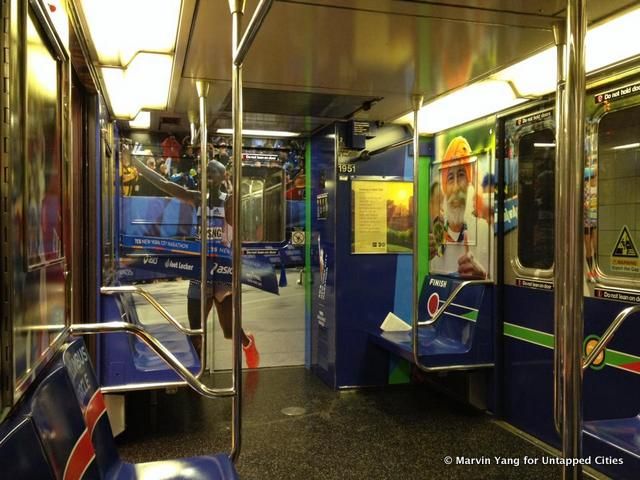

An Untapped Cities reader recently contacted the Untapped Mailbag wondering about the full, advertising takeovers on the S trains in New York City.
The MTA has attempted to stretch its advertisements to cover every nook and cranny in the subways–even attempting to install advertisements on the floors of the Union Square Station. Perhaps the most aggressive of the MTA advertisements are the advertising takeovers completely covering both the interior and exterior of trains.
These ads are most visible, and were first implemented, on the historic Shuttle to Times Square (or the 42nd Street Shuttle), with each current shuttle sporting an ad. However, the MTA has recently expanded these type of ads on both the 6 and 7 lines. These ads have been in place since 2008, overwhelming the riders of select trains with an advertisement takeover by companies ranging from the History Channel to the Super Bowl.
The 42nd street subway has historically been used as a testing ground for experimental modifications to the subways–from a conveyer belt-type system in the 1950s (check out our article on the system here) to the first advertising takeovers in the early 2000s. The 42nd street S line (one of three S or Shuttle lines in the city) was originally created in 1904 as part of the first NYC subway unveiling, eventually becoming the horizontal connecter of the H line.
The H line was unveiled sixteen years later in 1918, transforming the manhattan subway system from one line running north and south on Manhattan to two. Untapped reader Kofi sent us an inquiry into the history of the S line and its unique full body advertisements.
Though the implementation of the advertisement takeover on the interior and exterior of the trains began in 2008, the MTA has been using such advertisements on buses since the early 1990s. Application of the ads–made of vinyl–require much precision from the workers with the aid of both heat and rollers. The materials cost, per car, an astonishing $75,000, and the full body wrap is an option on a basic menu of subway advertisement selections.
Get in touch with the author @spencercnyc

